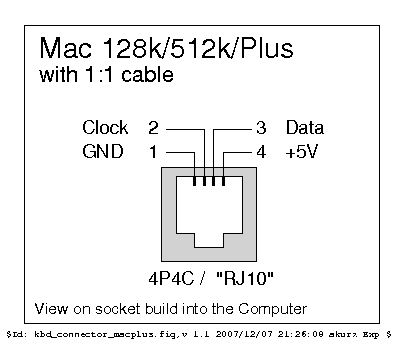|
|
14 years ago | |
|---|---|---|
| .. | ||
| doc | 14 years ago | |
| Makefile | 14 years ago | |
| README.md | 14 years ago | |
| config.h | 14 years ago | |
| keymap.c | 14 years ago | |
| led.c | 14 years ago | |
| matrix.c | 14 years ago | |
README.md
M0110/M0110A to USB keyboard converter
This firmware converts the protocol of Apple Macintosh keyboard M0110/M0110A into USB.
Target board of this project is PJRC Teensy, though,
you can use other board with USB AVR like ATmega32U4 and AT90USB.
M0110A support was contributed by skagon@github.
Connection
You need 4P4C plug and cable to connect Teensy or other AVR dev board into the keyboard.
Teensy port PF0 is assigned for CLOCK line and PF1 for DATA by default,
you can change pin configuration with editing config.h.
You can find 4P4C plugs on telephone handset cable. Note that it is crossover connection while Macintosh keyboard cable is straight.
In this pic:
GND(Black)CLOCK(Red)DATA(Green)+5V(Yellow)
Not that wire colors may vary in your cable.
Pinout
- http://pinouts.ru/Inputs/MacKeyboard_pinout.shtml
- http://en.wikipedia.org/wiki/Modular_connector#4P4C
Pull-up Registor
You may need pull-up registors on signal lines(CLOCK, DATA) in particular
when you have long or coiled cable. 1k-10k Ohm will be OK for this purpose.
In some cases MCU can't read signal from keyboard correctly without pull-up resistors.
Building Frimware
To compile firmware you need AVR GCC. You can use WinAVR on Windows. You can edit Makefile and config.h to change compile options and pin configuration.
$ git clone ... (or download source)
$ cd m0110_usb
$ make
and program your Teensy with PJRC Teensy loader.
Keymap
You can change keymaps by editing keymap.c.
M0110
Default
,---------------------------------------------------------.
| `| 1| 2| 3| 4| 5| 6| 7| 8| 9| 0| -| =|Backs|
|---------------------------------------------------------|
|Tab | Q| W| E| R| T| Y| U| I| O| P| [| ]| \|
|---------------------------------------------------------|
|Fn0 | A| S| D| F| G| H| J| K| L| ;| '|Return|
|---------------------------------------------------------|
|Shift | Z| X| C| V| B| N| M| ,| ,| /|Shift |
`---------------------------------------------------------'
|Ctr|Alt | Space |Gui |Ctr|
`-----------------------------------------------'
You can register Esc by hitting(press&release) Fn0 quickly.
HHKB/WASD cursor Layer(Fn0)
,---------------------------------------------------------.
|Esc| F1| F2| F3| F4| F5| F6| F7| F8| F9|F10|F11|F12|Delet|
|---------------------------------------------------------|
|Caps |Hom| Up|PgU| | | | |Psc|Slk|Pau|Up |Ins| \|
|---------------------------------------------------------|
|Fn0 |Lef|Dow|Rig| | | | |Hom|PgU|Lef|Rig|Return|
|---------------------------------------------------------|
|Shift |End| |PgD| |VoD|VoU|Mut|End|PgD|Dow|Shift |
`---------------------------------------------------------'
|Ctr|Alt | Space |Gui |Ctr|
`-----------------------------------------------'
M0110A
Default
,---------------------------------------------------------. ,---------------.
| `| 1| 2| 3| 4| 5| 6| 7| 8| 9| 0| -| =|Backs| |Gui| =| /| *|
|---------------------------------------------------------| |---------------|
|Tab | Q| W| E| R| T| Y| U| I| O| P| [| ]| | | 7| 8| 9| -|
|-----------------------------------------------------' | |---------------|
|Fn0 | A| S| D| F| G| H| J| K| L| ;| '|Return| | 4| 5| 6| +|
|---------------------------------------------------------| |---------------|
|Shift | Z| X| C| V| B| N| M| ,| ,| /|Shft|Up | | 1| 2| 3| |
|---------------------------------------------------------| |-----------|Ent|
|Ctrl |Alt | Space | \|Lft|Rgt|Dn | | 0| .| |
`---------------------------------------------------------' `---------------'
HHKB/WASD cursor Layer(Fn0)
,---------------------------------------------------------. ,---------------.
|Esc| F1| F2| F3| F4| F5| F6| F7| F8| F9|F10|F11|F12|Delet| |Nlk| =| /| *|
|---------------------------------------------------------| |---------------|
|Caps |Hom| Up|PgU| | | | |Psc|Slk|Pau|Up |Ins| | | 7| 8| 9| -|
|-----------------------------------------------------' | |---------------|
|Fn0 |Lef|Dow|Rig| | | | |Hom|PgU|Lef|Rig|Return| | 4| 5| 6| +|
|---------------------------------------------------------| |---------------|
|Shift |End| |PgD| |VoD|VoU|Mut|End|PgD|Dow|Shif|Up | | 1| 2| 3| |
|---------------------------------------------------------| |-----------|Ent|
|Ctrl |Alt | Space | \|Lft|Rgt|Dn | | 0| .| |
`---------------------------------------------------------' `---------------'
Debug
You can use PJRC HID listen to see debug output.
The converter has some functions for debug, press Alt+Gui+H simultaneously to get help.
These function is totally undocumented, tentative, inconsistent and buggy.
Arrow Keys
Dedicated arrow keys of the M0110A are transmitting the same scancodes as the keypad but also, its [=], [/], [*] and [+] keys (hereafter referred to as "calc" keys) are not assigned new scancodes but, instead, transmit a sequence of scancodes which emulates the [Shift] key press, followed by the same scancode sequence of the arrow keys! The problem with that approach is that, while in most cases it's easy to distinguish between a user-generated [Shift] key event (press or release) followed by an arrow or a calc key and a simulated [Shift] key event generated upon a calc key event, when the user is typing fairly fast, it is possible that the two events become indistinguishable, and produce undesired results -- nothing major, though, just one or two stray characters or cursor movements; it will NOT format your drives, kill your cat or make your wife run away with the pizza boy.


